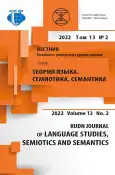Semantic Potential of the Word: by the Material of the Mythologem of the Holy Marriage of Heaven and Earth
- 作者: Vladimirova T.E.1
-
隶属关系:
- Peoples’ Friendship University of Russia
- 期: 卷 13, 编号 2 (2022)
- 页面: 294-306
- 栏目: SEMIOTIC AND POETIC TEXT STUDIES
- URL: https://journal-vniispk.ru/2313-2299/article/view/323497
- DOI: https://doi.org/10.22363/2313-2299-2022-13-2-294-306
- ID: 323497
如何引用文章
全文:
详细
The study of the initial semantics of the word and its further development in the history of the language and its speakers, undoubtedly, belongs to the number of topical problems of modern semasiology. Of particular research interest is the disclosure of the historical and etymological origins of the word, which largely predetermine its further development. The focus of this article is the East Slavic mythologeme of the sacred marriage of Heaven-father and Earthmother, the semantics of which has absorbed the sacred mode of pagan existence and Christian value ideas. The material of the study was the myths and proverbs of closely related Belarusian, Rusyn, Russian and Ukrainian languages, which go back to the East Slavic mythologeme of the sacred marriage of Heaven-father and Earth-mother and preserve a common cultural and semantic memory. The undertaken consideration of this mythologeme against the background of the Greek myths about the “beginning of the world” made it possible to characterize its original historical, etymological, ethical and aesthetic features. As a result, an appeal to the history of the word from the standpoint of the concept of evolving consciousness G.G. Shpet led to the conclusion about the special role of cultural memory, which accumulates the accumulated experience of the existence of the word and thereby increases its semantic potential.
作者简介
Tatyana Vladimirova
Peoples’ Friendship University of Russia
编辑信件的主要联系方式.
Email: yusvlad@rambler.ru
ORCID iD: 0000-0003-2458-3653
Professor, DSc, Russian Language Institute
6, Miklukho-Maclay st., Moscow, Russian Federation, 117198参考
- Karaulov, Yu.N. (1989). Russian language personality and the tasks of its study. In: Language and personality, D.N. Shmelev (ed.). Moscow: Nauka. (In Russ.).
- Shishova, Yu.L. (2002). Linguistic objectification of the path mythologeme in modern Englishlanguage literature [dissertation]. St. Petersburg. (In Russ.).
- Demyankov, V.Z. (1994). Cognitive linguistics as a kind of interpretive approach. Topics in the study of language, 4, 17–33. (In Russ.).
- Tolstaya, S.M. (2002). Slavic mythology. Encyclopedic Dictionary. Moscow: Mezhdunarodnye otnosheniya. (In Russ.).
- Tokarev, S.A. (1980–1982). Myths of the peoples of the world. Moscow: Sovetskaya entsiklopediya. (In Russ.).
- Benvenist, E. (1970). Dictionary of Indo-European social terms. Moscow: Progress-Univers. (In Russ.).
- Makovsky, M.M. (2016). Small etymological dictionary of modern French. From the history of the formation of pan-Slavic unity. Moscow: LENAND. (In Russ.).
- Chernykh, P.Ya. (1993). Historical and etymological dictionary of the Russian language: in 2 volumes. Moscow: Russkiy yazyk. (in Russ).
- Shaposhnikov, A.K. (2010). Etymological Dictionary of the Modern Russian Language: in 2 vols. Moscow: Flinta: Nauka. (In Russ.).
- Pop, D. (2011). Russian-Ukrainian-Russian and Russian-Russian-Ukrainian phrasebooks. Uzhgorod. (In Russ.).
- San’ko, Z.F. (1991). A brief Russian-Belarusian dictionary of proverbs, sayings and phrases. Minsk: Navuka i tekhnika. (In Russ.).
- Lepeshaў, I.Ya. & Yakaltsevich, M.A. (2002). The elephant of the Belarusian prikazaks. Minsk: Belarusian science. (In Russ.).
- Mokienko, V.M., Nikitina, T.G., & Nikolaeva, E.K. (2010). Large dictionary of Russian proverbs. Moscow: OLMA. (in Russ.).
- Dulichenko, A.D. (2015). Introduction to Slavic Philology. Moscow: Flinta. (In Russ.).
- Afanasiev, A.N. (1982). The tree of life: Selected articles. Moscow: Sovremennik. (In Russ.).
- Anikin, V.P. (1998). Russian incantations and spells: Materials of folklore expeditions 1953– 1993. Moscow: Moscow State University Publ. (In Russ.).
- Komarovich, V.L. (1960). Cult of the Family and the Land in the Princely Environment of the 11th—12th Centuries. In: Proceedings of the Department of Old Russian Literature. Moscow– Leningrad: Academy of Sciences of the USSR Publ. Vol. XVI. pp. 84–104. (In Russ.).
- Fedotov, G.P. (1991). Spiritual poems. Russian folk faith according to spiritual verses. Moscow: Progress, Gnosis. (In Russ.).
- Teliya, V.N. (1996). Russian phraseology. Semantic, pragmatic and linguoculturological aspects. Moscow: School “Languages of Russian culture”. (In Russ.).
- Trubachev, O.N. (2009). The history of the Slavic terms of kinship and some of the oldest terms of the social system. Moscow: KomKniga. (In Russ.).
- Vladimirova, T.E. (2017). Sacred code of Eurasian myths about the ancestor totem. Siberian Philological Journal, 3, 5–18. https://doi.org/10.17223/18137083/60/1
- Rybakov, B.A. (1981). Paganism of the ancient Slavs. Moscow: Nauka. (In Russ.).
- Eliade, M. (1999). Essays on Comparative Religion. In: Selected writings. Moscow: Ladomir. (In Russ.).
- Arutyunova, N.D. (2003). Will and freedom. In: Logical analysis of language. Cosmos and chaos: Conceptual fields of order and disorder. Moscow: Ingrik. pp. 73–99. (In Russ.).
- Grishina, E.A. (2011). Individualistic and collectivistic cultures. In: Psychology of communication. Encyclopedic Dictionary, A.A. Bodalev (Ed.). Moscow: Kogito-Centre. pp. 306–308. (In Russ.).
- Gura, A.V. (2011). Marriage and wedding in Slavic folk culture: semantics and symbolism. Moscow: Indrik. (In Russ.).
- Hesiod (2001). Complete texts. Moscow: Labyrinth. (In Russ.).
- Shakhnovich, M.I. (1968). Creation World Myths. Moscow: Znaniye. (In Russ.).
- Losev, A.F. (1991). Philosophy. mythology. Culture. Moscow: Publishing house of political literature. (In Russ.).
- Ivanov, Yu.V. Mythological parallels in the story of N.V. Gogol “Terrible Revenge” in the legends of the Rusyns of the North of Moldova. Golden Lion, 97–98. URL: http://www.zlev.ru/97_1.htm/ (accessed 15.12.2021). (In Russ.).
- Tolstoy, N.I. (1995). Language and folk culture. Essays on Slavic mythology and ethnolinguistics. Moscow. (In Russ.).
- Melnikov, V.G. (comp.) (2021). Eternal Truths. Winged words, proverbs, sayings of biblical origin. Moscow: Siberian chime. (In Russ.).
- Ivanov, E.E., Lomakina, O.V. & Petrushevskaya, Yu.A. (2021). The National Specificity of the Proverbial Fund: Basic Concepts and Procedure for Determining. RUDN Journal of Language Studies, Semiotics and Semantics, 12(4), 996–1035. https://doi.org/110.22363/2313-22992021-12-4-996-1035 (In Russ.).
- Uspensky, B.A. (1994). Semiotics of history. Semiotics of culture. In: Selected works. Vol. 1. Moscow: Gnosis. (In Russ.).
- Zinchenko, V.P. (2010). Consciousness as a creative act. Moscow: Yazyki slavyanskih kul’tur. (In Russ.).
补充文件









